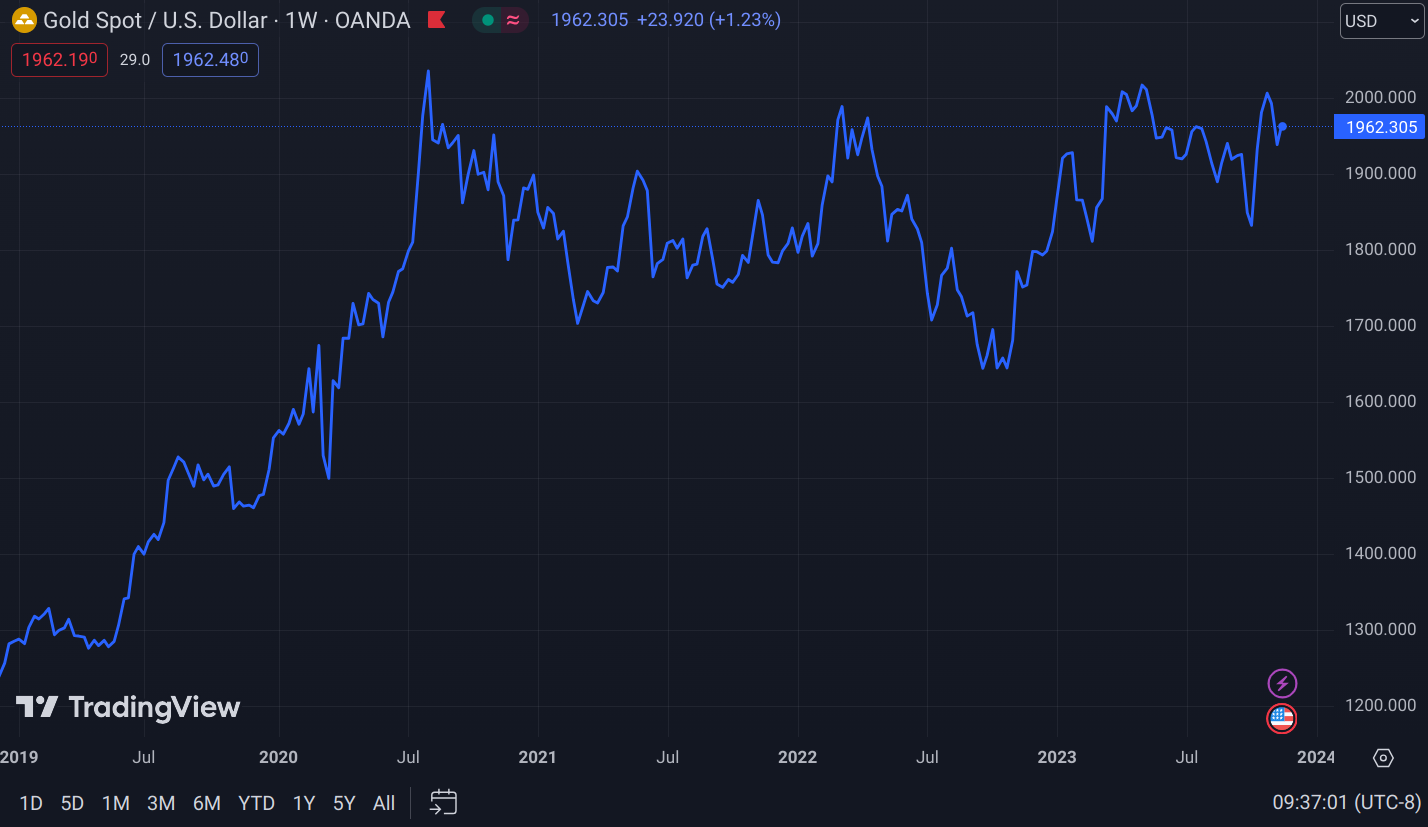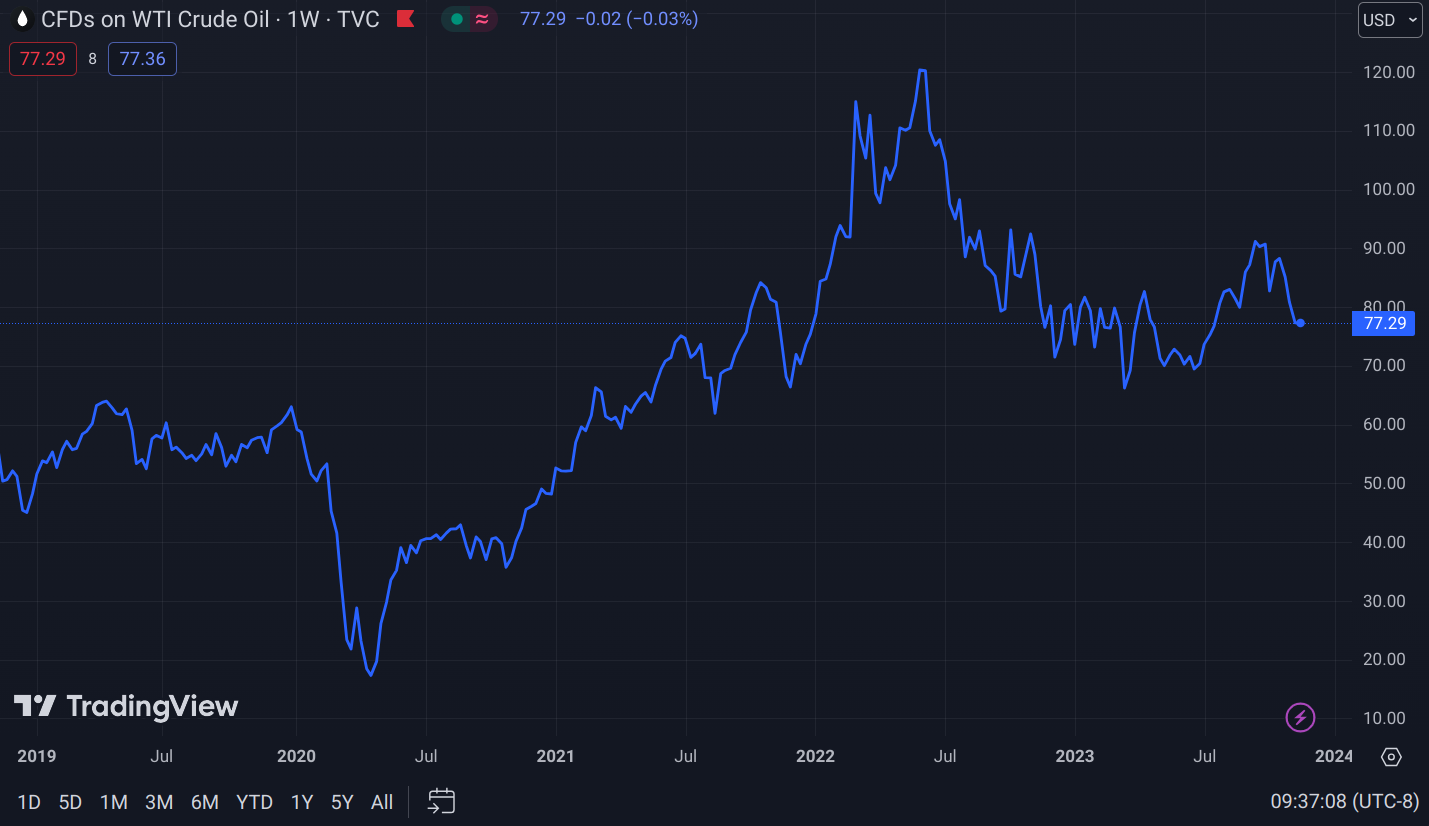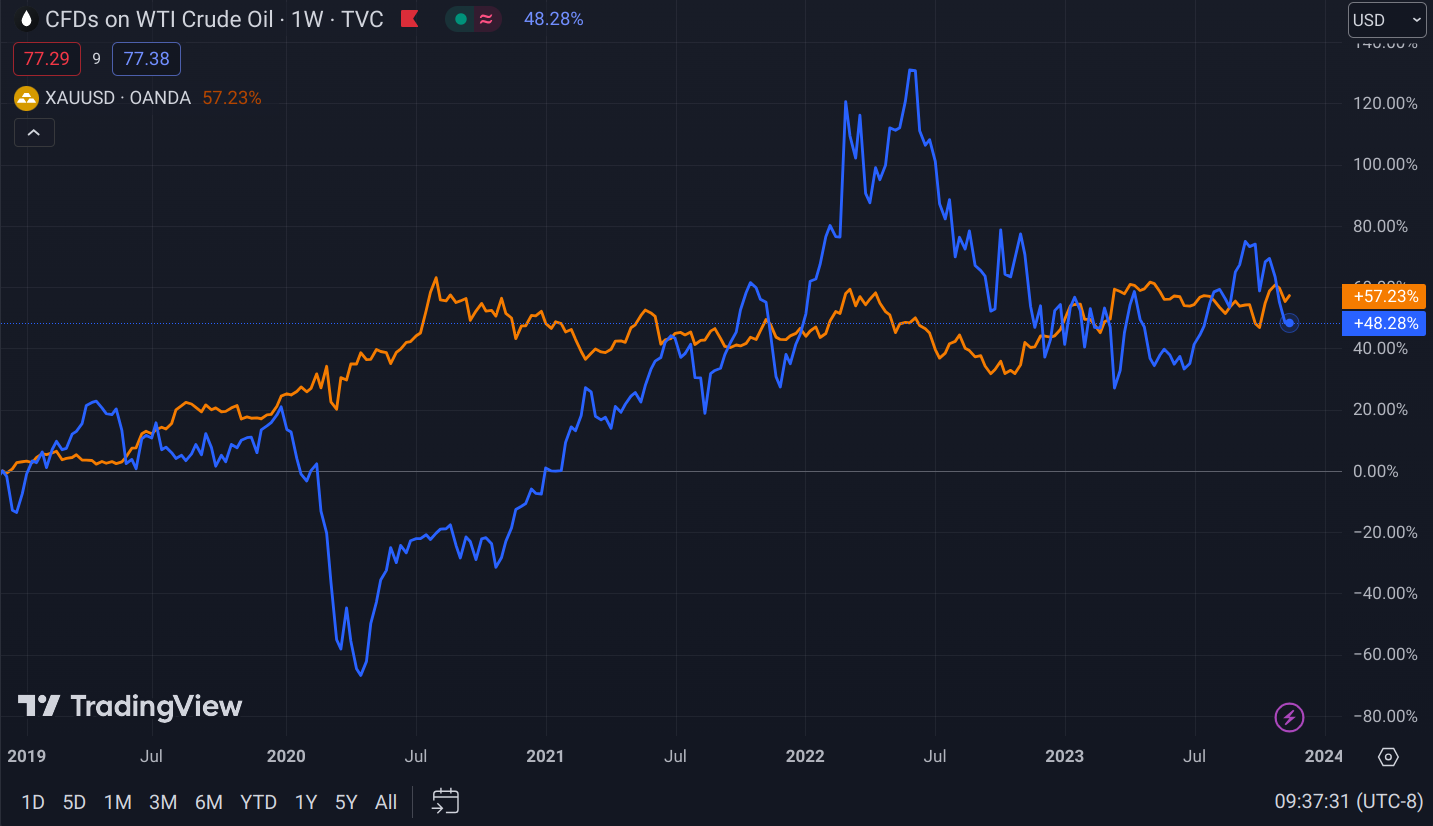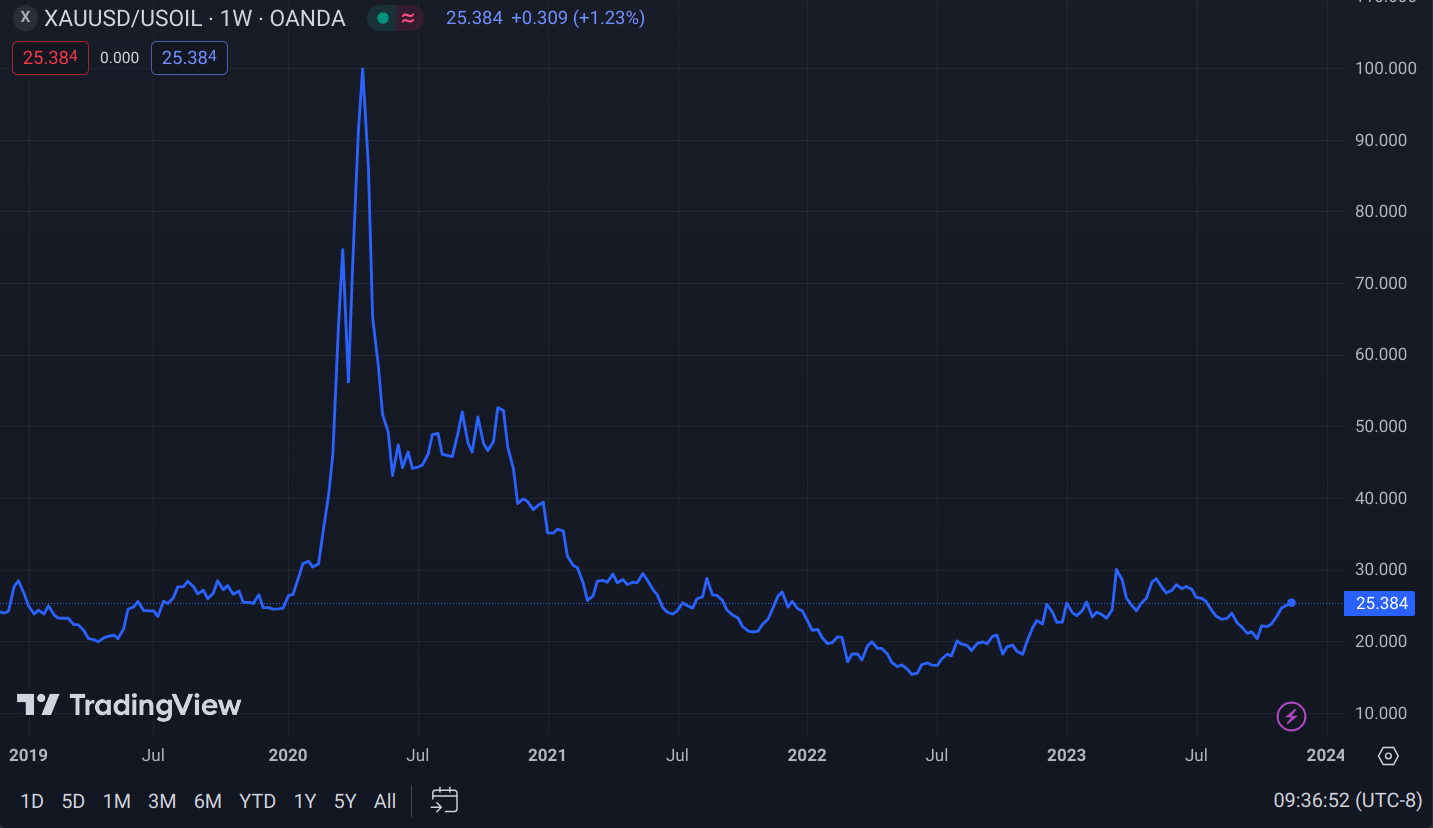Today, I only have questions.
After reading "The Gold Cartel" by Dimitri Speck some time ago and listening to the good folks over at Mining Stock Daily, among others, I have become open to the idea that governments manipulate the gold price. Maybe it's just the US but more likely, it's a covert game played by all of the world's central banks.
Ok, fair enough.
The paper market also has a distortive effect on the price and is used way more for speculation than it is by producers to hedge their production.
Alright.
I'm not an insider so I treat those as asterisks on gold as an investing vehicle. There's one thing that puzzles me enough that I think about it often and that is the relationship between gold and oil. At first blush there doesn't seem to be any relationship at all.
The part that mystifies me is the ratio of gold to oil, particularly over longer periods of time.
The huge spike in early 2020 was due to the price of oil (the denominator) going to zero on its way to a low of negative thirty eight dollars a barrel.
The strange thing about this ratio is how it always seems to return to a value around 22. Is there some natural reason why one ounce of gold should be the same dollar price as 22 barrels (880 gallons) of oil?
Of course it takes oil to harvest gold from a mine but why is this ratio so steadfast and why does that steady ratio persist over periods of years? Neither gold nor oil revolve around stable values over similar timescales so why should their ratio?
Gold market manipulation
Long time observers of the gold market point out how the New York open of trading systematically causes the gold price to get hammered down after whatever happened during the Asian trading hours. This diurnal dynamic is the source of much speculation so it won't hurt much to add my own take. Could the US be intervening in the gold market to maintain the gold-oil ratio at some predetermined level? And, if that's the case, are we already and have we been for many years on a oil-gold standard?
If that is the case, then it damages the bull argument for the price of gold in US dollar terms. Gold might be a great trade in other currencies as the inflation they import from the US wrecks their currencies and bond markets while gold and the dollar remain synchronized to some extent. But for American investors or anyone else who saves mostly in USD, gold could essentially be dead money as it has been for multiyear periods during the last couple decades. This isn't exactly a bear case because the macroeconomic forces which tend to be bullish for gold remain in place but it is a mitigating factor if it’s part of the gold price dynamic. Alternatively, if the US does maintain a quasi-peg to gold, then this could be a great time for US investors to build a position before the peg breaks.
Is the bull case bullish?
At the heart of the bull case for gold is that US monetary and fiscal policy profligacy, which seem to be sustained by a collective suspended disbelief that the US could ever lose its hegemony. This is far from assured. All historical hegemons have eventually evaporated. What would make the US different on long enough time scales?
If continued recklessness causes the dollar to be unseated as the world's reserve currency, what does that mean for the American investor? The international investor? Whatever comes next is likely to be controlled by America's adversaries who have all been stockpiling gold and other commodities. Yes, the gold in your IRA may have gone up in value, but at what cost?
Americans take for granted that they can get on a plane and fly to far away places for a holiday. What happens if the gold-oil ratio remains roughly where it is when gold doubles or triples? How much will that ticket cost in USD terms? How much to fill the gas tank of a big car?
Owning gold is essentially an insurance policy against the sudden devaluation of the dollar versus real things but what about everything else that's priced in dollars including salaries? If the gold bulls get what they want from the gold price, they may not get what they want from the world that emerges on the other side.
Hyperinflation
Despite sharing a common root, inflation is fundamentally different from hyperinflation. Inflation, like the kind we've experienced for the past couple of years, is a supply and demand driven change in the general price level. Hyperinflation is the destruction of a currency in real terms. They can exist simultaneously but hyperinflation is a far worse problem.
Adam Fergusson's book, "When Money Dies," is an excellent chronicle of the hyperinflation that visited Weimar Germany. One of the key observations he made is that, for the people of Germany, it didn't feel like their money was dying, at least at first. It just felt like the rest of the world was abusing their pricing power and taking it out on German citizens. As prices on everything went up, labor unions clamored for higher wages. Lenders went broke as the real value of their loan book trended toward zero in months at first and eventually days. There was even a period when workers would be paid in the morning, then given time to go shopping for essentials before beginning the workday. This helped mitigate the rise in prices that would have occurred during their shifts.
The hyperinflationary spiral persisted until Weimar central bankers repegged the currency to a hard asset, namely land, in the form of the rentenmark. This period amounted to a repudiation of all debt and a collapse of the currency. In a very real sense, the country was economically rebooted. Aside from a few savvy speculators, it was a uniformly difficult and stressful time to live in Germany.
Eventually, the deutchmark was completely destroyed and German civil society along with it. There was even a new mental illness called zero stroke, where patients had a compulsion to write endless sequences of zeroes. Inflation is bad but hyperinflation is truly terrible. Anyone hoping for hyperinflation so that their digital ducats or their gold holdings go “to the moon” probably don't know what they're really wishing for. They may do well financially in relative terms in that event but the whole of society may be in complete disarray for years if not decades afterward.
Depegged
If the US is intervening to maintain a stealth peg to the gold-oil ratio, will they let it go if they start to lose control of the currency or, more importantly, the bond market? That would amount to yet another devaluation and at least partial default. If they do let go, what happens to the ratios of those newly unpegged things? To say this could be a financial supernova is only a slight exaggeration.
No one I listen to or read is talking about what the world could really look like on the other side of a global currency crisis. Most are only talking about the financial consequences. Will there be social unrest? Will ambitious populists take advantage of the moment to bring about a new global conflict?
Whatever happens to markets may be minor compared to what happens to civil societies or even civilization itself.
None of the above or anything in Liberty Papers should be considered investing advice.








> Neither gold nor oil revolve around stable values over similar timescales so why should their ratio?
Well both are real commodity goods, as opposed to fiat. Thus it would make sense that their ratios would stay nearly constant even as fiat fluctuates around them.
Cool article! I'm reminded of smart people who respond to the gold bulls by saying: "You don't actually want to live in a world where your OZ of gold is worth $10,000."